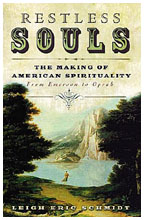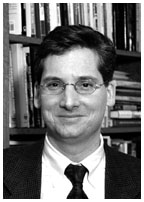December 14, 2005: Reading Room
Leigh Eric Schmidt *87 traces modern spirituality to the Transcendentalists. (courtesy HarperSanFrancisco) |
Seeking
the source of seeking
Leigh Eric Schmidt *87 probes the origin of spirituality in America
By Justin Nyberg ’01
I’m spiritual, but not religious,” was a statement Leigh Eric Schmidt *87 heard too many times to resist his historian’s impulse to get at the roots of it.
In his latest book, Restless Souls: The Making of American Spirituality, published by HarperSanFrancisco in September, the Princeton professor of religion probes the source of spiritual seeking in America, and finds it has a far more robust intellectual and cultural heritage than critics of so-called New Age spirituality have given it credit for.
 The
American popular zest for nurturing the inner light — from Zen-flavored
bestsellers to yoga resorts and a churchlike devotion to Oprah Winfrey
— is more than a hangover from the 1960s counterculture movement,
Schmidt argues.
The
American popular zest for nurturing the inner light — from Zen-flavored
bestsellers to yoga resorts and a churchlike devotion to Oprah Winfrey
— is more than a hangover from the 1960s counterculture movement,
Schmidt argues.
He traces American spirituality — defined as an individual relationship with divine experience, usually found in solitude and nature, and distinct from traditional religious dogma — directly to the Transcendentalists. In the early and mid-19th century, disaffected religious liberals, including Emerson and Thoreau, helped reinvigorate old ideas of mysticism and self-seeking solitude. They popularized a more secular brand of soul nurturing that inspired generations of seekers — including Walt Whitman, W.E.B. DuBois, Max Ehrmann, and others.
Since liberal religious thinking often went hand in hand with liberal politics, Schmidt connects the history of what he calls the “spiritual left” to its myriad manifestations in activism and public policy — from abolitionists to the civil rights movement to current political debates.
As much as it is a history of lonely religious seekers, Restless Souls is also a defense of do-it-yourself religious liberalism against a tradition of attacks by orthodox critics, who often dismiss it as godless narcissism run amok, a superficial all-you-can-eat trip down a theological buffet. Schmidt argues that such criticism is as easy as it is useless, failing to recognize the emphasis on ethics, community, and self-reliance that spiritual progressives have espoused for over 150 years.
“I think there is much more seriousness out there than those kinds of images convey,” says Schmidt, who majored in religion and history at the University of California, Riverside. He earned a doctorate in religion from Princeton, where he’s been teaching since 1995.
Adherents to traditional faiths still far outnumber the ranks of the spiritually self-skippered in America. But Schmidt, who counts himself among the latter, argues that the uniquely American forces that begat the spiritual left — democratic faith in individual choice, tolerance of religious pluralism — ensure that it will remain a part of popular culture despite the flood of bile and satire from the right.
“‘New spirituality’ is old,” Schmidt writes.
“The spiritual left goes deep in the grain of American culture;
it is here for the long haul.” ![]()
Justin Nyberg ’01 writes for Outside magazine in Santa Fe, N.M.
BOOK SHORTS
 An Unplanned Life — GEORGE McKEE ELSEY ’39 (University
of Missouri Press). The author, at age 24, was assigned to Franklin Roosevelt’s
top-secret intelligence and communications center in the White House.
In this memoir, Elsey offers a revealing glimpse into the Roosevelt and
Truman administrations. (As an aide to President Truman, he decoded and
delivered this urgent message: “Big bomb dropped on Hiroshima ...
First reports indicate complete success.”)
An Unplanned Life — GEORGE McKEE ELSEY ’39 (University
of Missouri Press). The author, at age 24, was assigned to Franklin Roosevelt’s
top-secret intelligence and communications center in the White House.
In this memoir, Elsey offers a revealing glimpse into the Roosevelt and
Truman administrations. (As an aide to President Truman, he decoded and
delivered this urgent message: “Big bomb dropped on Hiroshima ...
First reports indicate complete success.”)
 Two Harbors — KATE BENSON ’03 (Harcourt). In this
novel, Casey Maywood is abandoned by her mother, who leaves their small
town in Minnesota for Hollywood, dreaming of becoming a star. Later, an
older man, Dex Stone, shows up from Los Angeles and momentarily helps
Casey feel free of her past. After Dex dies in a plane crash, Casey goes
to Hollywood to search for her mother and learn more about Dex. Benson
teaches English in Southborough, Mass.
Two Harbors — KATE BENSON ’03 (Harcourt). In this
novel, Casey Maywood is abandoned by her mother, who leaves their small
town in Minnesota for Hollywood, dreaming of becoming a star. Later, an
older man, Dex Stone, shows up from Los Angeles and momentarily helps
Casey feel free of her past. After Dex dies in a plane crash, Casey goes
to Hollywood to search for her mother and learn more about Dex. Benson
teaches English in Southborough, Mass.
 The Unknown Battle of Midway: The Destruction of the American Torpedo
Squadrons — ALVIN KERNAN (Yale University Press). Of the
51 planes sent to attack Japanese carriers in the Battle of Midway, only
seven returned, and not a single torpedo hit its target. This book reveals
what the author, who served in the U.S. Navy and witnessed the battle,
argues were avoidable mistakes that led to the destruction of four torpedo
squadrons. Kernan is an emeritus professor of humanities at Princeton.
The Unknown Battle of Midway: The Destruction of the American Torpedo
Squadrons — ALVIN KERNAN (Yale University Press). Of the
51 planes sent to attack Japanese carriers in the Battle of Midway, only
seven returned, and not a single torpedo hit its target. This book reveals
what the author, who served in the U.S. Navy and witnessed the battle,
argues were avoidable mistakes that led to the destruction of four torpedo
squadrons. Kernan is an emeritus professor of humanities at Princeton.
![]()
By K.F.G.
For a complete list of books received, click here.

